Arco Determinism: Difference between revisions
mNo edit summary |
m Text replacement - "Category:2022 Award winning pages" to "{{Template:Award winning article}} Category:2022 Award winning pages" |
||
| (14 intermediate revisions by 3 users not shown) | |||
| Line 1: | Line 1: | ||
[[File:Cowboy 1.jpg|thumb|Arco cattle ranchers round up some of their herd in the late 1800s.]] | |||
'''Arco Determinism''', also known as '''Frontier Spirit''', is the governing political and cultural philosophy of Arcer citizens, a group of Cronan-naturalized Ardmori and Gaelic peoples who arrived between the 18th and 20th centuries to Southern Crona. The central ideology of Arcerion is a cultural and societal belief that the Arcer people (of the two major migratory groups during the colonial era) are destined to settle, civilize, and create a modern Occidental state in Crona. Concurrent to this, it is a common goal of the society and culture to defend Arcerion and its people, and by extension extend the rule of the Ardori Crown. It also represents a common ethnic and cultural heritage from AEngles, Gaels, and Ardmori peoples on values such as community, the family compact, and self-reliance. | |||
== Etymology and Philosophy == | == Etymology and Philosophy == | ||
The term is essentially two distinct parts, that being Arcerion and the philosophy of Determinism. In essence, this is the philosophical doctrine that every state of affairs, including every human event, act, and decision, is the inevitable consequence of antecedent states of affairs. In layman's terms this is referenced as cause-and-effect. Arcers believe that their settlement and nation building have determined that they are the rightful owners and caretakers of much of the Southeastern Cronan Peninsula. The cultural belief itself is blended with ethnic and social values from the settlement of the Arcer plains and lowlands, in which bands of settlers would forage together and set up communities, battling disease, Indigenous peoples, wildlife, famine, and inclement weather to forge a new state. It is in this vein that the Arco people see themselves - a frontier spirit wherein their effort and toil determine them to be the civilization that has dominion over Southeastern Crona. | |||
[[File:Settlers defend.png|thumb|Arco settlers defend an overturned wagon and their families from an Indigenous raiding party, c.1845.]] | |||
The philosophy is rooted in two major components - the idea that one's actions determine a designated or determined outcome, that is inherent and absolves one truly of free will. In this instance, a farmer who chose to sleep in and miss their harvest cannot be upset when their crop is destroyed by weather, as it was their choice to not harvest and instead rest. Secondary to this is the emphasis on self-reliance and independence of spirit. Not to be confused with individual liberty, this half of the philosophy more closely relates to a Frontier Spirit. The idea that oneself is alone and must rely on effort, wit, and guile to overcome challenges and adversity in life. In the community sense, this was forged by bands of settlers ranging inland to establish towns, farms, and settlements, on which would be the skeleton that Acerion built its nation from. | |||
== Origin == | == Origin == | ||
While the actual origin of the term "Arco Determinism" originates much later than the founding of the Arcer colony, early versions included "Frontier Spirit" and "Settler Conviction," although both would fade with Arcer independence. The first publication to use the phrase was the ''Kurst Financial Times'', which in 1854 coined the phrase in an article on an expedition of settlers being ambushed while escorted by members of the Royal Arcer Constabulary. It quoted, "..it is these brave souls lost that are the heart of the Arcer nation. This Arco Determinism that has itself set on bringing civilization, good governance, justice, and security into the continent's lowlands that is the altar upon which these men and women are the nation's sacrifice." | |||
Although criticized at the time for the publication, the term would become common parlance, especially within the Confederate Parliament, which would incorporate it into the Arcer Constitution upon full independence in 1895. In the Constitution, the philosophy was incorporated as ''"Understanding that it Arcer Determinism will be the vessel unto which the nation expands its influence, through diplomacy, commerce, or if necessary by force, into Crona."'' | |||
== Principles == | == Principles == | ||
=== General Principles === | === General Principles === | ||
In general, there is a reduced emphasis on individual liberty in favour of a collectivist ethos. While certain elements of liberal theory emerge in Arco Determinism (ie. the individual right to bear arms stemming from the need of settlers and farmers to defend themselves), generally the ideology is a mixture of conservative and liberal beliefs. In general, an emphasis on traditional family compacts, community involvement, access to healthcare, firearms ownership and education, strong municipal and governorate-policing, individual right of governorates to self-govern, limited federal governmental powers, classical economics, and progressive social policies for underprivileged represent the core ethos of Arcerion. While seemingly many of these are at odds, Arcers believe that it is their national duty and cultural obligation to work together and find common ground, as culturally and historically to not do so often resulted in razed settlements, failed crops, famine, or border conflict. | |||
=== Liberal Principles === | === Liberal Principles === | ||
[[File:Meeting.png|thumb|A town hall meeting in Moorden Governorate.]] | |||
The liberal principles of Arcer Determinism denote that the role of the state is twofold. First, at the governorate level, it is to provide for those who cannot provide for themselves. This comes in the form of social programs like subsidized daycare for single parents, regulated firearms laws that allow for possession of handguns, shotguns and other forms of weapons, food stamps and government-organized clothing and food centers for the impoverished, a progressive healthcare system that incentivizes emergency and critical care access for the most vulnerable, and common-sense policing with strong after-school and gang de-radicalization programs. The second portion of the role of the state is at the federal level. While Arcers pride themselves on small government, harkening back to an era where Kurst was weeks away by messenger (until the advent of rail and steam river boats), the federal government is mainly responsible for national security, foreign policy and investment, regulation of marco-commerce, centralized banking, regulation of financials sectors to prevent fraud and abuse of capitalist principles, and national infrastructure such as canals, waterways, and the Arcer National Railway Service (ANRS). Under the liberal context, this means that 'big government' or 'parent state' functions are decentralized to the Governorate-level, reducing the size and requirement for an overly-large federal government. | |||
=== Conservative Principles === | === Conservative Principles === | ||
The other side of Arcer Determinism's two-sided coin is conservative beliefs that place a higher value on social ties and traditional Arcer cultural norms. What this translates to is modern legislation or foreign policy being shaped almost directly, and in most cases described as linearly, by past events or cultural trends. For example, with the rise of gun crime in Oakham Governate in the 1960s due to the rise of communist and socialist gangs and revolutionaries, some called for more strict gun laws to restrict the use of weapons. This however failed overwhelmingly in the Confederate Parliament, as traditional Arcer values of firearms ownership are a key tenet of the Frontier Spirit. The emphasis on traditional values such as leadership, authority, and agrarianism. Leadership is inherent in frontier settlements, and this places an emphasis on smart, informed community leaders protecting and governing their respective jurisdictions.[[File:Northlea Flag.png|thumb|Flag of Northlea Governorate, representing the blend of Carnish Monarchy (red lion), Arco agriculture (yellow), and the Cronan landscape (green). ]] | |||
The emphasis on decentralized governance and community consensus is no more prevalent that in the official name of Arcerion, the Confederated Provinces of Arcerion. Arcerion is technically still a grouping of provinces (the Governorates) that observe the Constitution and are joined in a common union, that to protect the fate and right to self-govern of the Arcer peoples. | |||
=== Overall Core Principles === | |||
* Limited federal or centralized government ('small government'); | |||
* Strong agrarian roots and environmental protectionism; | |||
* Classical economic policies and acceptance of capitalist trends; | |||
* Strong national security apparatus (military, gendarmerie, national intelligence services); | |||
* Foreign policy based on a blended approach of politics, commerce, and use of force; | |||
* Social programs and community involvement to create and maintain a strong cultural and social fabric based on Ardmori, AEnglish, and Gaelic traditions; | |||
* Individual liberties are balanced in government with strong societal requirements; | |||
* Strong emphasis on education (up to and including the post-secondary level); | |||
* Caretaker or 'paternal state' philosophy decentralized to the governorate-level. | |||
== Role in Arcer Society == | == Role in Arcer Society == | ||
In Arcer society the lack of a defined code has caused issues historically, with some believing that Arco Determinism has a single define Agrarian focus, wherein others believe that it relies on rapid industrialization and exploitation of the nation's natural resources. However, culturally there has always has been a focus on three main tenets: agrarianism (and herein environmentalism in the modern context), community, and family. These three tenets form a trinity upon which most of Arcerion is built. From strong families come strong communities, and strong communities form the backbone of Arcerion. | |||
[[File:Arco Rugby.png|thumb|Rugby continues to be a staple sport in Arcerion due to its emphasis on teamwork, grit, and its historical role as the national sport.]] | |||
One of the major impacts this has is the Arcer birth rate, as traditional family values have helped keep the annual birth rate at a steady 1.2-1.4, with the population not having a modern Occidental problem of declining birth rates and aging population. As well, the frontier spirit also has placed an incredibly important placement on the role of nature and the outdoors in everyday life. Arcer cities are usually greener than their Cronan counterparts, both in terms of civic amenities such as parks, public places, and waterways, and in terms of their sustainability, carbon impact, and overall ecological footprint. For example, while Easthampton's mines produce a fair amount of pollution as do the mineral refineries, the city makes efforts to ensure the air is clean and smog free. Inland, small towns have tractor parking and some of the oldest establishments in Arcerion still have hitching posts for farmers or citizens who ride into town, as seen at the Presdale Post Office. | |||
== Lasting Impacts and Modern Interpretations == | |||
In modern society there is a general trend to fall back onto the more conservative principles of Arco Determinism. Progressive movements such as socialism, communism, and new liberalism all have had starts and rather quick ends in Arcer culture. This usually ends with a dual Arco diaspora, those that were rejected from the fabric and monolith that is Arcer society, and those that are ambassadors and caretakers of national values who moved abroad to seek other opportunities or to spread such values. In modern Arcer culture, these groups are respectively called those who are 'Afly' (ie. leaving to gain extra skills or in good cultural/societal standing), or those who are 'Astray,' (those who do not consider themselves Arcer. | |||
[[File:Arcerion.png|thumb|247x247px|Sovereign Cronan territory of the Confederated Provinces of Arcerion.]] | |||
This in general creates an interesting phenomenon for Arcer culture, wherein it is a melting pot for immigrants and those who come from different cultures, but it also encourages the society to remain homogeneous, wherein public institutions such as national broadcasters and print/TV media are less likely to influence change and more likely to reinforce existing cultural values or norms. Concurrent to this, modern Arcers are extremely against immigration wherein parallel societies are created. This was most recently seen in Oakham Governorate, where a school specifically for Indigenous children and adults to further continue their education was closed down and construction halted due to mass protests both at the building site, and at the centers of government protesting separate private education for other cultures. Notably, these incidents not only included native-born Arcers that were culturally Ardmori, Gaelic, or AEngle, but in many prominent cases, there were outspoken naturalized citizens from [[Alstin]], [[Paulastra]], and [[Stenza]] that disagreed with the institution's establishment. | |||
== Effects on Foreign Policy == | |||
Arcer Foreign Policy is as equally influenced by Arco Determinism as is domestic agendas. The Arcosphere was a term coined in the 1960s with the onset of the Fourth Bush War, identifying the need for a buffer zone to allow unimpeded access to fresh water for farming irrigation, as well as to prevent marauding bands of terrorists or rebels from crossing into the Arcer Lowlands and harassing the ordinary citizenry. This eventually grew to encompass the majority of what Arcerion attempts to present to the public. Arcerion's focus on grain and farming exports, importing novel technologies to improve the industrialization of farming, and its defense of natural waterways are all key cornerstones of national politics and foreign policy. In this instance, interruptions to grain exports such as threats to its freedom of navigation, or impacts to the watershed that supports Oakham, Northlea, and Moorden Governorates create sizeable political talking points with neighbours such as Telokona, Paulastra, the [[New Archduchy]], and [[the Cape]]. | |||
In general, the historical requirement for collaboration and community on the frontier has culturally ingrained itself in the nation's foreign policy, which is best described through a 1908 ''Kurst Daily Times'' editorial, where former Member of Confederate Parliament and then Foreign Secretary, the RtHon. Justin A.F. Horace was quoted as saying, ''"..Arcer foreign policy is perhaps the most simple in Crona, collaborative to the point of violence."'' In this instance, this reflects Arco Determinism, working together to achieve a common goal that benefits the community (from a foreign policy lens, Crona inclusive of the Malentine and Songun Seas), but only to a point, wherein use of force becomes the primary focus in order to leverage the requirements for a secure and peaceful resolution that benefits economic growth. | |||
[[File:Kelekona Peackeeping.png|thumb|2026 Kelekonan Peacekeeping Agreement between Arcerion and the Cape. ]] | |||
Economic treaties such as the [[Cronan Security and Trade Union]] are a main focus of Arcerion's approach to collaborative foreign policy. In general, Arco foreign policy initiatives are collaborative attempts at solving geopolitical issues between sovereign nations. This is evident with the [[Banana-Grain Agreement]], a pact with Stenza to allow for mutually benefitting free trade, or the agreements with the Nysdra Sea Treaty Association allowing for Arco Grain and farm imports without tarriffs to assist with preventing famine in the war-torn former Varshani states. | |||
The opposite side of this is that where diplomacy and commerce fail, Arcerion will take two approaches to use of force. The first is unilateral approaches utilizing Arcer Commandos, members of the intelligence services ([[Office of Public Safety and National Security|OPSNS]]), or its conventional forces to exert national or diplomatic will. An example of this would be the 2026 Kelekonan Peacekeeping Agreement, wherein Arcer access to fresh water was partially threatened due to the instability in [[Kelekona]], and wherein Arcerion was able to deploy forces on a rotational, continuous basis to defend the national interest. Concurrent to this, the counter-insurgency and counter-terror operations in the Northwestern Border Security Zone (NWBSZ) are emblematic of the 'posse' approach to dealing with rebels and insurgents. Groups of civilians aide the paramilitary ''gendarmes'' of the Royal Arcerion Constabulary in policing and suppressing dissent and defending their farms and towns, while the military conducts wide-sweeping and long-range patrols to disrupt, degrade, destroy, and deny the enemy's ability to continue harassing Arcer citizens and their interests. | |||
[[Category: Arcerion]] | |||
[[Category: Crona]] | |||
{{Template:Award winning article}} | |||
[[Category:2022 Award winning pages]] | |||
[[Category: IXWB]] | |||
Latest revision as of 10:15, 10 August 2023
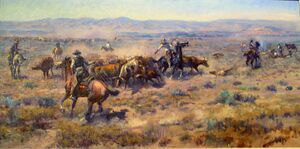
Arco Determinism, also known as Frontier Spirit, is the governing political and cultural philosophy of Arcer citizens, a group of Cronan-naturalized Ardmori and Gaelic peoples who arrived between the 18th and 20th centuries to Southern Crona. The central ideology of Arcerion is a cultural and societal belief that the Arcer people (of the two major migratory groups during the colonial era) are destined to settle, civilize, and create a modern Occidental state in Crona. Concurrent to this, it is a common goal of the society and culture to defend Arcerion and its people, and by extension extend the rule of the Ardori Crown. It also represents a common ethnic and cultural heritage from AEngles, Gaels, and Ardmori peoples on values such as community, the family compact, and self-reliance.
Etymology and Philosophy
The term is essentially two distinct parts, that being Arcerion and the philosophy of Determinism. In essence, this is the philosophical doctrine that every state of affairs, including every human event, act, and decision, is the inevitable consequence of antecedent states of affairs. In layman's terms this is referenced as cause-and-effect. Arcers believe that their settlement and nation building have determined that they are the rightful owners and caretakers of much of the Southeastern Cronan Peninsula. The cultural belief itself is blended with ethnic and social values from the settlement of the Arcer plains and lowlands, in which bands of settlers would forage together and set up communities, battling disease, Indigenous peoples, wildlife, famine, and inclement weather to forge a new state. It is in this vein that the Arco people see themselves - a frontier spirit wherein their effort and toil determine them to be the civilization that has dominion over Southeastern Crona.
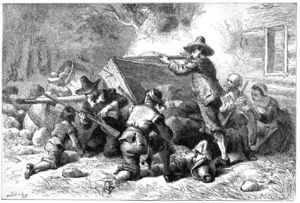
The philosophy is rooted in two major components - the idea that one's actions determine a designated or determined outcome, that is inherent and absolves one truly of free will. In this instance, a farmer who chose to sleep in and miss their harvest cannot be upset when their crop is destroyed by weather, as it was their choice to not harvest and instead rest. Secondary to this is the emphasis on self-reliance and independence of spirit. Not to be confused with individual liberty, this half of the philosophy more closely relates to a Frontier Spirit. The idea that oneself is alone and must rely on effort, wit, and guile to overcome challenges and adversity in life. In the community sense, this was forged by bands of settlers ranging inland to establish towns, farms, and settlements, on which would be the skeleton that Acerion built its nation from.
Origin
While the actual origin of the term "Arco Determinism" originates much later than the founding of the Arcer colony, early versions included "Frontier Spirit" and "Settler Conviction," although both would fade with Arcer independence. The first publication to use the phrase was the Kurst Financial Times, which in 1854 coined the phrase in an article on an expedition of settlers being ambushed while escorted by members of the Royal Arcer Constabulary. It quoted, "..it is these brave souls lost that are the heart of the Arcer nation. This Arco Determinism that has itself set on bringing civilization, good governance, justice, and security into the continent's lowlands that is the altar upon which these men and women are the nation's sacrifice."
Although criticized at the time for the publication, the term would become common parlance, especially within the Confederate Parliament, which would incorporate it into the Arcer Constitution upon full independence in 1895. In the Constitution, the philosophy was incorporated as "Understanding that it Arcer Determinism will be the vessel unto which the nation expands its influence, through diplomacy, commerce, or if necessary by force, into Crona."
Principles
General Principles
In general, there is a reduced emphasis on individual liberty in favour of a collectivist ethos. While certain elements of liberal theory emerge in Arco Determinism (ie. the individual right to bear arms stemming from the need of settlers and farmers to defend themselves), generally the ideology is a mixture of conservative and liberal beliefs. In general, an emphasis on traditional family compacts, community involvement, access to healthcare, firearms ownership and education, strong municipal and governorate-policing, individual right of governorates to self-govern, limited federal governmental powers, classical economics, and progressive social policies for underprivileged represent the core ethos of Arcerion. While seemingly many of these are at odds, Arcers believe that it is their national duty and cultural obligation to work together and find common ground, as culturally and historically to not do so often resulted in razed settlements, failed crops, famine, or border conflict.
Liberal Principles
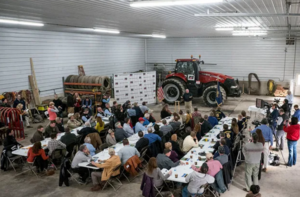
The liberal principles of Arcer Determinism denote that the role of the state is twofold. First, at the governorate level, it is to provide for those who cannot provide for themselves. This comes in the form of social programs like subsidized daycare for single parents, regulated firearms laws that allow for possession of handguns, shotguns and other forms of weapons, food stamps and government-organized clothing and food centers for the impoverished, a progressive healthcare system that incentivizes emergency and critical care access for the most vulnerable, and common-sense policing with strong after-school and gang de-radicalization programs. The second portion of the role of the state is at the federal level. While Arcers pride themselves on small government, harkening back to an era where Kurst was weeks away by messenger (until the advent of rail and steam river boats), the federal government is mainly responsible for national security, foreign policy and investment, regulation of marco-commerce, centralized banking, regulation of financials sectors to prevent fraud and abuse of capitalist principles, and national infrastructure such as canals, waterways, and the Arcer National Railway Service (ANRS). Under the liberal context, this means that 'big government' or 'parent state' functions are decentralized to the Governorate-level, reducing the size and requirement for an overly-large federal government.
Conservative Principles
The other side of Arcer Determinism's two-sided coin is conservative beliefs that place a higher value on social ties and traditional Arcer cultural norms. What this translates to is modern legislation or foreign policy being shaped almost directly, and in most cases described as linearly, by past events or cultural trends. For example, with the rise of gun crime in Oakham Governate in the 1960s due to the rise of communist and socialist gangs and revolutionaries, some called for more strict gun laws to restrict the use of weapons. This however failed overwhelmingly in the Confederate Parliament, as traditional Arcer values of firearms ownership are a key tenet of the Frontier Spirit. The emphasis on traditional values such as leadership, authority, and agrarianism. Leadership is inherent in frontier settlements, and this places an emphasis on smart, informed community leaders protecting and governing their respective jurisdictions.

The emphasis on decentralized governance and community consensus is no more prevalent that in the official name of Arcerion, the Confederated Provinces of Arcerion. Arcerion is technically still a grouping of provinces (the Governorates) that observe the Constitution and are joined in a common union, that to protect the fate and right to self-govern of the Arcer peoples.
Overall Core Principles
- Limited federal or centralized government ('small government');
- Strong agrarian roots and environmental protectionism;
- Classical economic policies and acceptance of capitalist trends;
- Strong national security apparatus (military, gendarmerie, national intelligence services);
- Foreign policy based on a blended approach of politics, commerce, and use of force;
- Social programs and community involvement to create and maintain a strong cultural and social fabric based on Ardmori, AEnglish, and Gaelic traditions;
- Individual liberties are balanced in government with strong societal requirements;
- Strong emphasis on education (up to and including the post-secondary level);
- Caretaker or 'paternal state' philosophy decentralized to the governorate-level.
Role in Arcer Society
In Arcer society the lack of a defined code has caused issues historically, with some believing that Arco Determinism has a single define Agrarian focus, wherein others believe that it relies on rapid industrialization and exploitation of the nation's natural resources. However, culturally there has always has been a focus on three main tenets: agrarianism (and herein environmentalism in the modern context), community, and family. These three tenets form a trinity upon which most of Arcerion is built. From strong families come strong communities, and strong communities form the backbone of Arcerion.

One of the major impacts this has is the Arcer birth rate, as traditional family values have helped keep the annual birth rate at a steady 1.2-1.4, with the population not having a modern Occidental problem of declining birth rates and aging population. As well, the frontier spirit also has placed an incredibly important placement on the role of nature and the outdoors in everyday life. Arcer cities are usually greener than their Cronan counterparts, both in terms of civic amenities such as parks, public places, and waterways, and in terms of their sustainability, carbon impact, and overall ecological footprint. For example, while Easthampton's mines produce a fair amount of pollution as do the mineral refineries, the city makes efforts to ensure the air is clean and smog free. Inland, small towns have tractor parking and some of the oldest establishments in Arcerion still have hitching posts for farmers or citizens who ride into town, as seen at the Presdale Post Office.
Lasting Impacts and Modern Interpretations
In modern society there is a general trend to fall back onto the more conservative principles of Arco Determinism. Progressive movements such as socialism, communism, and new liberalism all have had starts and rather quick ends in Arcer culture. This usually ends with a dual Arco diaspora, those that were rejected from the fabric and monolith that is Arcer society, and those that are ambassadors and caretakers of national values who moved abroad to seek other opportunities or to spread such values. In modern Arcer culture, these groups are respectively called those who are 'Afly' (ie. leaving to gain extra skills or in good cultural/societal standing), or those who are 'Astray,' (those who do not consider themselves Arcer.
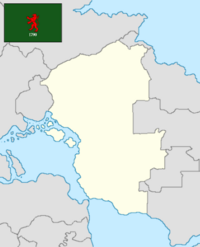
This in general creates an interesting phenomenon for Arcer culture, wherein it is a melting pot for immigrants and those who come from different cultures, but it also encourages the society to remain homogeneous, wherein public institutions such as national broadcasters and print/TV media are less likely to influence change and more likely to reinforce existing cultural values or norms. Concurrent to this, modern Arcers are extremely against immigration wherein parallel societies are created. This was most recently seen in Oakham Governorate, where a school specifically for Indigenous children and adults to further continue their education was closed down and construction halted due to mass protests both at the building site, and at the centers of government protesting separate private education for other cultures. Notably, these incidents not only included native-born Arcers that were culturally Ardmori, Gaelic, or AEngle, but in many prominent cases, there were outspoken naturalized citizens from Alstin, Paulastra, and Stenza that disagreed with the institution's establishment.
Effects on Foreign Policy
Arcer Foreign Policy is as equally influenced by Arco Determinism as is domestic agendas. The Arcosphere was a term coined in the 1960s with the onset of the Fourth Bush War, identifying the need for a buffer zone to allow unimpeded access to fresh water for farming irrigation, as well as to prevent marauding bands of terrorists or rebels from crossing into the Arcer Lowlands and harassing the ordinary citizenry. This eventually grew to encompass the majority of what Arcerion attempts to present to the public. Arcerion's focus on grain and farming exports, importing novel technologies to improve the industrialization of farming, and its defense of natural waterways are all key cornerstones of national politics and foreign policy. In this instance, interruptions to grain exports such as threats to its freedom of navigation, or impacts to the watershed that supports Oakham, Northlea, and Moorden Governorates create sizeable political talking points with neighbours such as Telokona, Paulastra, the New Archduchy, and the Cape.
In general, the historical requirement for collaboration and community on the frontier has culturally ingrained itself in the nation's foreign policy, which is best described through a 1908 Kurst Daily Times editorial, where former Member of Confederate Parliament and then Foreign Secretary, the RtHon. Justin A.F. Horace was quoted as saying, "..Arcer foreign policy is perhaps the most simple in Crona, collaborative to the point of violence." In this instance, this reflects Arco Determinism, working together to achieve a common goal that benefits the community (from a foreign policy lens, Crona inclusive of the Malentine and Songun Seas), but only to a point, wherein use of force becomes the primary focus in order to leverage the requirements for a secure and peaceful resolution that benefits economic growth.
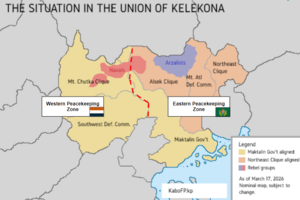
Economic treaties such as the Cronan Security and Trade Union are a main focus of Arcerion's approach to collaborative foreign policy. In general, Arco foreign policy initiatives are collaborative attempts at solving geopolitical issues between sovereign nations. This is evident with the Banana-Grain Agreement, a pact with Stenza to allow for mutually benefitting free trade, or the agreements with the Nysdra Sea Treaty Association allowing for Arco Grain and farm imports without tarriffs to assist with preventing famine in the war-torn former Varshani states.
The opposite side of this is that where diplomacy and commerce fail, Arcerion will take two approaches to use of force. The first is unilateral approaches utilizing Arcer Commandos, members of the intelligence services (OPSNS), or its conventional forces to exert national or diplomatic will. An example of this would be the 2026 Kelekonan Peacekeeping Agreement, wherein Arcer access to fresh water was partially threatened due to the instability in Kelekona, and wherein Arcerion was able to deploy forces on a rotational, continuous basis to defend the national interest. Concurrent to this, the counter-insurgency and counter-terror operations in the Northwestern Border Security Zone (NWBSZ) are emblematic of the 'posse' approach to dealing with rebels and insurgents. Groups of civilians aide the paramilitary gendarmes of the Royal Arcerion Constabulary in policing and suppressing dissent and defending their farms and towns, while the military conducts wide-sweeping and long-range patrols to disrupt, degrade, destroy, and deny the enemy's ability to continue harassing Arcer citizens and their interests.